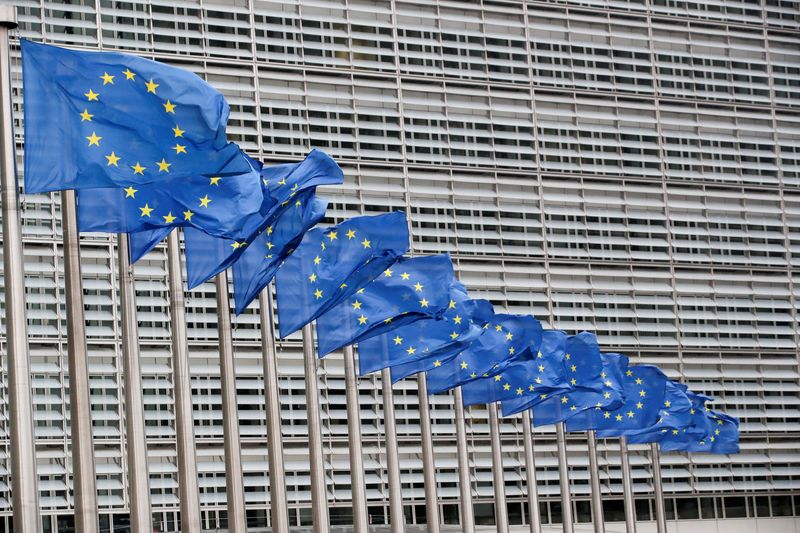

© Reuters. FILE PHOTO: European Union flags flutter outside the EU Commission headquarters in Brussels, Belgium, July 14, 2021. REUTERS/Yves Herman/File Photo
By Philip Blenkinsop
BRUSSELS (Reuters) -European Union policymakers agreed new rules on Tuesday to promote local production of equipment for solar and wind power, fuel cells and other clean technologies and help Europe’s industry compete with Chinese and U.S. rivals.
The bloc aims to set a 2030 target of producing 40% of the products it needs to reduce greenhouse gas emissions. These will cover renewable energy, nuclear power, heat pumps, electrolysers and other decarbonising technologies, including carbon capture.
Europe is increasingly relying on China, which is forecast to have 80% of global manufacturing capacity in solar power for example. It also has concerns that the $369 billion of green subsidies in the U.S. Inflation Reduction Act (IRA) will entice European producers to relocate.
European Parliament lawmakers and Belgium, which holds the six-month rotating EU presidency, reached agreement on the Net-Zero Industry Act (NZIA) after a full day of talks.
The act is a centrepiece of the EU’s push to ensure it is not only a global leader in cutting greenhouse gas emissions, but also in manufacturing the clean tech required.
Likely to enter force later this year, the NZIA proposes streamlining the granting of permits for projects that boost EU manufacturing, ensuring they are issued within 18 months.
Public authorities buying clean tech products would have to base their choices not only on the price, but also on environmental criteria and on whether more than 50% of supply is from a single source.
EU countries would need to apply non-price criteria for 30% of their auctions for renewable energy projects.
“The overarching message is that for the first time Europe is reacting to the IRA,” Christian Ehler, who led the lawmaker’s group, told a news conference, adding that it would also help the bloc reach its new 2040 emissions target, also announced on Tuesday.
Hitting the 40% production target will be particularly tough in solar, given domestic manufacturers supply less than 3% of EU panel deployments and are fighting for survival. The EU wind energy sector is far stronger, although Chinese companies are starting to gain a foothold.
Also, while the NZIA will give the EU greater flexibility to support local production and seeks to coordinate various EU funds, it will not have a pot of new money to rival the IRA. A mooted European Sovereignty Fund has failed to materialise.






